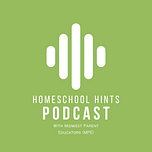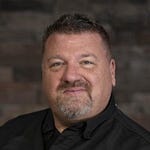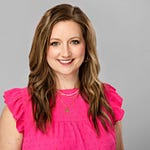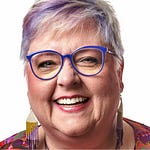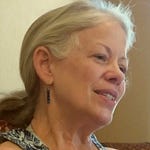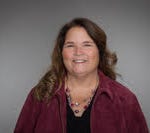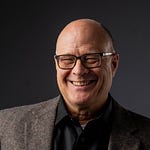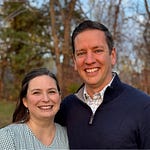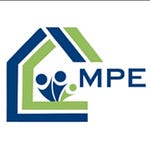TRANSCRIPT
Shanxi: Hello, this is Shanxi Omoniyi, host of MPE’s “Homeschool Hints” podcast to encourage you wherever you may be on your homeschool journey.
We're so excited to have a special chat with Suzanne Wandling. And Suzanne, you've appeared on the podcast before, and your expertise is in unique learners and special needs homeschooling. Why don't you just start by introducing yourself briefly to those who haven't met you before?
Suzanne: Yes, thank you for having me today, Shanxi. I'm so excited to be here. My background is in elementary and special education, and I've worked with homeschooling families for over 20 years and I'm passionate about helping families help their kids be their best, to grow into all that the Lord has for them. And I'm delighted that MPE is serving families in a new way this year.
I've just had the privilege to start as MPE's unique learners coordinator. I'm really looking forward to seeing what's going to go through MPE in the coming year.
Shanxi: Congratulations! We're so glad you're on board. We know it's a huge undertaking and you are providing so many resources and so much help to a ton of families in the Kansas City area, and even beyond.
So, can you tell us a little bit about this new initiative, this unique learners coaching program?
Suzanne: Yes, what you might not know is there's been a lot of shifts in the home-schooling world with resources for special ed families, and the Home School Legal Defense Association used to have a whole division, if I understand correctly, supporting families with unique needs and that service has not been renewed. They have decided not to move forward with those resources.
And so MPE finds itself in a really special position where we can look at where families’ current needs are. And we can, on a local MPE level, start serving families and some of their needs.
Shanxi: Can you speak a little bit to just the homeschool movement as a whole, and special needs in the homeschool movement? I know it's such a “growing by leaps and bounds” segment of the homeschool population. How have you seen that change and develop over the years?
Suzanne: I was just looking at the National Home Education Research Institute's most recent study. That's a mouthful: NHERI for some people, that Doctor Brian Ray did. He has updated research from the end of 2024, and I was just going over that data of why people homeschool.
50.17% of families are choosing to school at home with their students because of a specialized health need or learning need. So fully 50%. So that's a staggering number if you think about that, if you looked at just the global number of people.
So, for example, in dyslexia, one out of five or 20% of people have dyslexia. So, if we look at 20% of the population experiences some form of dyslexia, but 50% of homeschoolers are looking for support or homeschooling to remedy those needs – that's a true need.
Shanxi: Do you want to speak to a little bit about why we chose a coaching program as opposed to, say, a mentoring program or a counseling program?
Suzanne: Yes. So, I've had the privilege to serve as a coach for homeschooling families, either in a one-on-one setting or in a group setting for over 20 years. And from my experience, it makes the most impact for families.
You know, a lot of people might not understand what coaching is, so maybe I'll tell you a little bit about what it is – because everybody knows what a baseball coach is. But what is a life coach, or what is a homeschool coach? How does that work?
First off, coaching is not counseling. Counseling is great, and it fills a very special need and that need is typically healing. And it's also not mentoring.
And while mentoring is very valuable, say – you know how to teach someone how to ride a bicycle, right? You help them purchase the equipment. You help them know where to ride. You help them how to get in shape, to be a great rider. And then you hold them accountable for being a good rider. And so, there's lots of different steps and this program will incorporate mentoring as well.
What's really cool about coaching is it takes it another level. I've had this happen in coaching and working with families in the past few years, and this is a repetitive conversation I have with families.
A parent will ask me, do I really need to use all those little parts in the reading curriculum?
And I will say, yes you do. Tear them all apart and use every one of them. But what are they really asking? Are they saying, Well, I don't have time to tear apart all those little pieces. I'm not an organized person.
If I tear them all apart, where will they go?
Will I have a toddler raid on my curriculum, and not be able to find it?
So there's this mindset, right? You're going through all these layers.
One question could be, do I have time to teach with all the manipulatives?
But ultimately what we arrive at is a very deep question to the effect of, well, what if I do all that work and I plan all those times to do all the lessons, and my student’s still not reading?
So, there's some mindset or fear that, if it were uncovered, would really free you up to teach with all in your heart and help eliminate that fear.
Plus, you're doing it in a community. So, in a coaching community, we can encourage each other and lift each other up. And so, it's just an exciting time.
I call it space and grace. So we need time to process, time to think about it, the grace to understand and reflect. But then also time to say, OK, I'm going to work on this. So I want to dig into this, and I want to grow. And so that's why we chose a coaching model to help make an impact for families.
Shanxi: Right. Thank you so much. I love that explanation because I know yes, if you could say, you know, this is guaranteed to work, we would jump through hoops, we would climb Mount Everest, we would do everything we needed to do. But there's always that little niggling fear of, like you said, what if I do everything right and it still doesn't work?
Suzanne: Right, right. And I think as homeschooling moms and dads of unique learners, there can be a lot of doubts and fears and confusion. When we have the opportunity to sit with that a little bit, we can dispel some of those fears. We can really focus on pressing into the Lord and what he has for us and our children and just really get a sense of peace, but also a path to where we want to grow.
Shanxi: Something that you mentioned to make me think about the special challenges, you know, facing these parents of unique learners.
And I think one of them that I hear perhaps most frequently – I'm not sure if it's the most frequent, but I do hear it frequently – is something along the lines of, I'm not certified for this. I'm not trained for this. Let's just leave it to the experts. Let's just leave special ed to the special ed experts, and I'm just totally not equipped. How do you begin processing that kind of mindset?
Suzanne: I love that question, Shanxi. Thank you for asking that.
It's a little bit like someone saying they can't teach high school algebra or what have you. There's so many ways to approach it, but I think first, in that mindset, is knowing that you don't have to do it alone.
There's a lot of different ways you can do it. You can look for additional resources and support. You can create partnerships, like working with other families.
Parents know their kids best. They're their first and best teacher. They always will be because they know their child that the Lord blessed them with, so they know their child. And they can provide support and resources.
To me, I think about it like the high school model. There's going to be some classes that you teach, some things that you do and there's going to be some things that you create partnerships with, but I think that you can do a lot in the home to help your student grow. And I think that with some good resources and support and just knowing what's available, then you can do a lot to support your kids.
Shanxi: So, what should people know about a coaching program and just kind of the general format? How many times should they plan on attending? What's the work? What's the time commitment involved? All those kinds of things?
Suzanne: The way our coaching model is set up is that we will meet approximately once a month between September and May.
And we take one or two months off throughout the year due to scheduling.
And then what happens is we meet virtually for 60 to 90 minutes once a month, and we have a topic that the parents will receive in advance, and then we will explore that topic, and then we will have a short training, and then a coaching around that topic.
The way families prepare for that is they come with their questions, they provide their question the day before or they come ready to participate in whatever level they feel comfortable participating in.
The time commitment, like any other program, you can participate just during the program or you can just do some follow up with journaling. We encourage families to journal, so it's based on, you know, what your investment level of time is.
There will also be throughout the September to May timeframe “office hours” where you might e-mail a question in advance, and then we'll have an office hour as well, to help maybe to answer questions or provide additional support.
And so that's the format: so, a monthly webinar and approximately a monthly open office for your support.
To get started, families will want to complete the application form so they can think about what their schedule is, what their topics of interests are. For example, we're going to be covering everything from executive function skills to specific needs such as dyslexia or ADHD, and then things that impact our day-to-day, like how to adapt curriculum.
I always wondered how you could in the same day have laundry, a lesson, and dinner. You know, there's that part too, right? So we're going to cover topics that are relevant to families to help them to grow and learn together.
And really, just enjoy peace in the process. Because at the end of the day, we want our child to be valued and to learn what the Lord has made them capable of learning in a joyful way. That's the best part, right?
Shanxi: Yes, I mean, it won't always look how we intended or how we envisioned.
Suzanne: For sure. Yes.
Shanxi: Is it going to be, you know, a really huge group? Is it going to be a very small group? Can you give us some ideas of the numbers?
Suzanne: So we will have up to 15 participants. So every person who wants to attend. So if a mom and a dad both want attend, they would be considered a participant and so up to 15 participants, we are taking registrations now and we are anticipating starting the week of Sept. 18. So you’ll want to get your application started.
There's a few steps to get started, and then there's a small materials fee for $20. Each participant will receive a coaching journal.
If you were to do this coaching program on your own, there would be an investment. But since this is geared towards MPE families, and it is a benefit for those who are part of MPE, we're excited to offer that.
Shanxi: And can you just give us for comparison what this type of model might cost in something outside the home, school community or outside of MPE?
Suzanne: Oh sure, if you were to have one-on-one coaching for a month, there's generally a six-month commitment for $199 a month. There's a great value. Any group coaching would be, depending on how it's set up, between $49-79 a month.
Shanxi: Yeah. I wonder if that's also another reason why sometimes homeschooling unique learners can feel so isolating, because a lot of the resources out there can seem just out of reach for the average homeschool family.
Suzanne: Yes. Well, we're hoping to add more value to them, but then also to provide more resources along the way. As I mentioned, MPE is continuing to grow in this area of serving families, and so we encourage families to be on the watch for more resources coming in the future as well.
Shanxi: Do you want to speak on the services that MPE has already offered unique learners, such as at the conference, for instance, or these learning screenings that you also helped initiate?
Suzanne: Oh, yes, absolutely. So we are finding that families are looking for different ways to learn more about their students. So a couple of things we do for them is in the spring at the MPE conference – and this year, this is March 6th and 7th – we will be having learning screenings that will take place for reading, speech and language and then also in multi-sensory screenings for students.
And so, when parents have more information about how their students function, then they can obviously serve them better.
We also provide a unique learners track for speakers at the conference, and so we have sessions dedicated specifically to families with unique learners, and then we’re in the process of also building for MPE families aresource bank.
I anticipate that will be beginning later, maybe at the beginning of 2026, but it's coming. We're putting together resources for families as well, so we're just moving forward to meet the needs of families, and I have to say, we did a survey for families in December, and they asked. And so we're answering. These are the things that families requested. They wanted resources, they wanted support ideas, opportunities to connect, and so we're hoping by building on what we already have and starting this coaching community, that we can meet some of the needs that families have requested.
Shanxi: For sure. Something that I also hear a lot is, like you mentioned, the support area because it can feel isolating, especially if your child is, you know, not the typical child – more obvious than, say ,in some other children, that they have very different learning styles.
Suzanne: I guess I call that the silo effect, if you will, where families typically will just kind of pull into themselves because they don't know what to do or they maybe had a couple of hiccups along the way. And so now they don't know where to go for hangouts or ways to work on different skills.
And so, I think that building a community is really valuable because it's not just the resources. It's also not feeling alone, but being able to say, Wow, my neighbor down the street, that I didn't even know was homeschooling, is in MPE and has the same need. And so just really being able to make those connections, it gives families a lot of energy, gives them encouragement and it just helps them to feel like they are doing all the right things too.
Shanxi: I know you mentioned most of these are going to happen virtually. Is there any plans or any thoughts of having an in-person meetup at any point?
Suzanne: Yes, we are anticipating having one of the first meetings of the year in person. So we are working out the location for that right now. Because community is a big deal and that was mentioned in the survey, we want to give families the opportunity to meet as we launch our program. So there will be an optional in-person meeting as we get started as well.
Philippians 1:6 - He who began a good work in us will perfect it until the day of Christ Jesus. So we want to leave plenty of room for that.
Shanxi: Well, thank you so much, Suzanne. This has been wonderful. I'm so grateful for, you know, your time and your energy and your commitments to, you know, serving just the homeschool families and communities in general. So is there anything else that you think we should mention or explain about the program?
Suzanne: Yes, I would say dive in. I just invite families to join us, to check it out, to meet with some other families. I think you'll be surprised on the benefit and the encouragement of being a part of our special community that wants to go together.
Shanxi: Thanks so much for listening. We hope you are encouraged in your homeschool journey.
Please continue the conversation with us on our website, midwesthomeschoolers.org, or email us at podcast@midwestparenteducators.org. We're also active on social media if you'd like to connect with us there. Thanks to Kevin McLeod of incompetech.com for providing this royalty-free song Wholesome, which is licensed under creativecommons.org.

